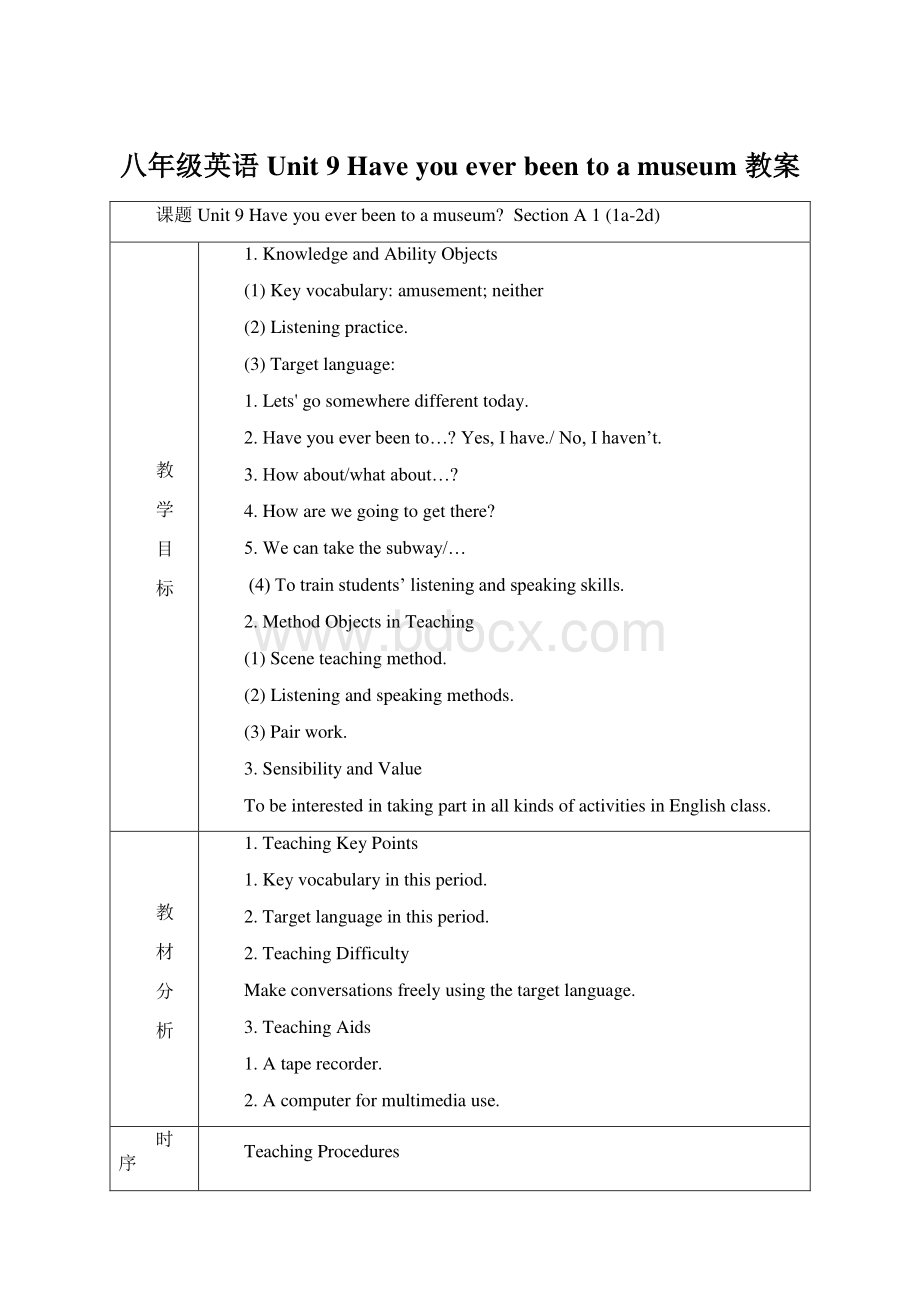八年级英语Unit 9 Have you ever been to a museum 教案.docx
《八年级英语Unit 9 Have you ever been to a museum 教案.docx》由会员分享,可在线阅读,更多相关《八年级英语Unit 9 Have you ever been to a museum 教案.docx(25页珍藏版)》请在冰豆网上搜索。

八年级英语八年级英语Unit9Haveyoueverbeentoamuseum教案教案课题Unit9Haveyoueverbeentoamuseum?
SectionA1(1a-2d)教学目标1.KnowledgeandAbilityObjects
(1)Keyvocabulary:
amusement;neither
(2)Listeningpractice.(3)Targetlanguage:
1.Letsgosomewheredifferenttoday.2.Haveyoueverbeento?
Yes,Ihave./No,Ihavent.3.Howabout/whatabout?
4.Howarewegoingtogetthere?
5.Wecantakethesubway/(4)Totrainstudentslisteningandspeakingskills.2.MethodObjectsinTeaching
(1)Sceneteachingmethod.
(2)Listeningandspeakingmethods.(3)Pairwork.3.SensibilityandValueTobeinterestedintakingpartinallkindsofactivitiesinEnglishclass.教材分析1.TeachingKeyPoints1.Keyvocabularyinthisperiod.2.Targetlanguageinthisperiod.2.TeachingDifficultyMakeconversationsfreelyusingthetargetlanguage.3.TeachingAids1.Ataperecorder.2.Acomputerformultimediause.时序TeachingProceduresStep1GreetingsandRevisionGreettheclassandcheckthehomework.Step2Lead-in1.Guesstheplacesofthepictures;theyaretheBritishMuseum,spacemuseum,historymuseum,waterpark,zoo,amusementparkwhileleadinsentencepatterns:
“Haveyoueverbeento?
”2.SpeakingGetstudentstoworkinpairstopracticetheconversation:
“Haveyoueverbeento”“Yes,Ihave”/Not,Ihavent.Step3Pre-listening1.SectionA1aT:
OK.NowopenyourbooksonPage65.InPart1a,6placesaregiven.Pleasereadthenamesoftheseplaces.(Teacherwritesthenamesontheblackboard.)Whichoftheseplaceswouldyouliketovisit?
Rankthemfrom1to5.S4:
Amusementpark_,waterpark_,zoo_aquarium_spacemuseum_.S5:
Spacemuseum_,aquarium_,zoo_,waterpark_,amusementpark_S6:
2.TalkaboutthepictureStep4Listening1.Listenandchoosethebestanswer.Thefirstandthesecondquestionaimtolisteningtotime,andthethirdoneaimstolistenfortherelationship.Thisactivitytrainsstudentslisteningabilityforlisteningforspecificrelationship.1)WhendidSarahvisittheNationalScienceMuseum?
A.TodayB.YesterdayC.Lastyear2)WhendidClaudiavisitthenaturemuseum?
A.lastyearB.lastsummerC.Lastschooltrip3)Whatmaytherelationshipbebetweenthetwospeakers?
A.FriendsB.TeacherandstudentC.Motherandkid.Answer:
CCA2.Listenagain.Listenandchecktheboxes.Havethesestudentseverbeentotheseplaces?
SciencemuseumHistorymuseumArtmuseumNaturemuseumSpacemuseumClaudiaSarahStep5SpeakingAskandanswerinpairs:
A:
letsgosomewheredifferenttoday.B:
OK.Wheredoyouwanttogo?
A:
Haveyoueverbeentothespacemuseum?
B:
No,Ihavent.Howaboutyou?
A:
Step6Listening2a2b1.Listenandcircletheplacesthatyouhear.2.ListenagainandcircleTfortrueorFforfalse.Conversation11.Tinawenttothespacemuseumlastyear.T/F2.Johnhasneverbeentothespacemuseum.T/F3.Theyaregoingtotakethesubway.T/FConversation21.Lindahasbeentotheamusementpark.T/F2.Lindawenttotheamusementparkyesterday.T/F3.Lindaisgoingtotheamusementparkagainbybike.T/FConversation31.Frankhadagreattimeatthewaterpark.T/F2.Franksfriendhasneverbeentothewaterpark.T/F3.Frankandhisfriendaregoingskating.T/FAnswer:
TFTTFTFTT3.SpeakingLookatthemapin2aandmakeconversationsabouttheplaces.A:
Haveyoueverbeentothespacemuseum?
B:
Yes,Ihave.Howaboutyou?
A:
No,Ihavent.B:
Oh,itsfantastic.Letsgotomorrow.A:
OK.Howarewegoingtogetthere?
B:
Wecantakethesubway.amusementparkUsefulsentences:
Idreallyliketogothereagain.Whatbusdowetaketogetto?
Thereweresomanythingstodothere.NeitherhaveI.Letsgoinstead.Theresagreatnewplacefor4.ReadingReadtheconversationandanswerthequestions.1)WhendidJillgotothefilmmuseum?
2)WhatdoesJillloveaboutthefilmmuseum?
3)WhatdidJilllearnabout?
4)WhodidJillcampwithontheweekend?
5)HasAnnaeverbeencamping?
5.ListeningClosethebookandlisten.Thancompletetheblanks.Annawenttothefilmmuseum_.Shethinksthefilmmuseumisreally_.Shehas_beencamping.Jillwenttoehfilmmuseumin_.Shelovesalltheoldmoviecameras,andshelearnedabouttheinventionsthatledto_.Ontheweekend,Jill_inthemountainswithsomefriends.6.Role-playRole-playtheconversationin2d.A:
Iwenttothefilmmuseumlastweekend.Haveyoueverbeenthere?
B:
Yes,Ihave.IwenttherebackinApril.Step7Languagepoints1.Ilearnedabouttheinventionsthatledtocolormovies,too.我还了解了一些发明,它们成就了彩色电影。
此处learn是“了解;获知;得知”的意思,由介词about或of引入所获知的具体内容。
例如:
Thechildrenwereallshockedtolearnofthedeathoftheirheadmaster.得知校长去世,孩子们都十分震惊。
Ionlylearnedabouttheaccidentlater.我只是后来才得知了事故的情况。
2.Iveneverbeencamping.我从未野营过。
此句为现在完成进行时。
这一时态的结构为“havebeen+现在分词”,表示从过去某一时刻延续至今的动作。
在本句中,说话人使用这一时态来强调自己至今从未有过野营的经历,欠缺这方面的经验。
又如:
HesbeenwatchingTVallafternoon.他一下午都在看电视。
Wevebeenlivinglikethiseversincethebirthofmylittlebrother.自打我小弟弟出生,我们就一直这样生活。
Exercise1.我去过北京两次。
I___Beijingtwice.2.大声读书是一种学习英语的好方法。
Readingaloud____tolearnEnglish.3.昨天他没有去那,我也没去。
Hedidntgothereyesterday.__.4.我了解了一些电影的知识。
I__someinformationaboutmovie.5.他的粗心导致了这次失败。
Hiscarelessness__thisfailure.选用have,has填空:
1.I_toldhimthenews.2.She_comebackfromschool.3.You_wonthegame.按要求改写下列各句:
4.Theyhaveboughtacomputer.(改成否定句)_5.Hehaslosthisbook.(先改成一般疑问句,再作肯定与否定回答)__Step8Homework1.Practicethedialogueandrememberthelanguagepoints.2.Previewthenextlesson.课题Unit9Haveyoueverbeentoamuseum?
SectionA2(3a-3c)教学目标I.KnowledgeandAbilityObjects1.Keyvocabulary:
unbelievable,progress,rapid,unusual,toilet,encourage,social,peaceful,performance,perfect,itself,collect2.Targetlanguage:
1)Iwonderhowmuchmorecomputerwillbeabletodointhefuture2)Watchingthempreparetheteawiththebeautifulteasetsisjustasenjoyableasdrinkingtheteaitself3.Totrainstudentsreadingability4.Togetstudentsknowsomeknowledgeaboutmanykindsofmuseums.II.MethodObjectsinTeaching1)Skimmingfordetails.2)Readingforcomprehension.3)Communicativeapproach.III.SensibilityandValueToraisestudentsinterestoflearningEnglish.教材分析I.TeachingKeyPoints1.Keyvocabulary:
unbelievable,progress,rapid,unusual,toilet,encourage,social,peaceful,performance,perfect,itself,collect2.Targetlanguage:
1)Iwonderhowmuchmorecomputerwillbeabletodointhefuture2)WatchingthempreparetheteawiththebeautifulteasetsisjustasenjoyableasdrinkingtheteaitselfII.TeachingDifficulties1)Howtoimprovereadingskill.2)Tounderstandthepassageandtheculture.III.TeachingAids1.Acomputerformultimediause.时序TeachingProceduresStep1GreetingsandRevisionLookatthepicturesandmakeconversation:
A:
Haveyoueverbeento?
B:
Yes,Ihave./No,Ihavent.Step2Pre-reading1)Brainstorm:
thinkofthekindsofmuseumsthatyoucanname.2)Watchavideo.AvideoabouttheInternationalMuseumofToilets3)Learnthenewwords.Step3FastreadingThreestudentstalkaboutthemostinterestingmuseumstheyhaveeverbeento.Readthemagazinearticleandanswerthequestions.1.Whichthreemuseumsdothestudentstalkabout?
2.Whatdoyouthinkisthemostinterestingthingabouteachmuseum?
TrueorFalse()1.AmericanComputerMuseumonlyhasinformationaboutdifferentcomputersthere.()2.Kenthinkscomputerswilldomoreworkinthefuture.()3.InternationalMuseumofToiletsisaveryunusualmuseum.()4.Indiahasthemostadvancedtoilet.()5.Linlindidntknowwhyhergrandpaloveddrinkingandcollectingteaset.Step4DetailedreadingReadthepassageagainandanswerthequestions.1.WhatdoesKensayabouttheAmericanComputerMuseum?
2.WhatcanwelearnattheInternationalMuseumofToilets?
3.WhyistheHangzhouNationalTeaMuseumaniceplacetoenjoytea?
Whichoftheunderlinedwordsinthepassagehavethefollowingmeanings?
1.makesth.better2.becomebetter3.uncommon4.quiet5.made6.quickStep5Explanation1.ThemostinterestingmuseumIvebeentoistheAmericanComputerMuseum.多音节词和部分双音节形容词最高级加most构成,前面加the。
如:
themostbeautifulgirl2.Theoldcomputersweremuchbigger.much可修饰形容词比较级,表示得多。
如:
muchricheralittle,even,abit也可以修饰形容词比较级。
3.Iwonderhowmuchmorecomputerwillbeabletodointhefuture.不知道将来电脑还能够做些什么事情呢。
1)wonder表示“(对某事)感到疑惑;想要知道;想弄明白;琢磨”,后面常接由what,how,who或者if/whether引导的宾语从句。
e.g.Iwonderhowtheyregettingon.我想知道他们现在过得怎样。
Ijustwonderiftheyvearrivedsafely.我就想知道他们是否安全抵达了。
2)此句从句部分的原始结构是:
Howmuchmorewillcomputersbeabletodointhefuture?
是对陈述句Computerswillbeabletodo(much)moreinthefuture.(电脑将来能够做更多的事情。
)的提问。
由于充当了宾语从句,疑问结构改成了陈述结构:
howmuchmorecomputerswillbeabletodointhefuture,即:
将助动词还原到陈述句的位置。
e.g.Idontknowwhenhewillcome.我不知道他什么时候来。
Idontknowwherehelives.我不知道他住在哪里。
4.Italsoencouragesgovernmentsandsocialgroupstothinkaboutwaystoencouragesb.todosth.鼓励某人做某事e.g.Myfatherencouragedmetotakepartinthesportsmeeting.父亲鼓励我参加运动会。
5.Watchingtheteapreparationisjustasenjoyableasdrinkingtheteaitself.看沏茶的过程和饮茶本身一样令人愉快。
-able是一个典型的形容词后缀,可加在动词之后,表示“可.的;能够的”。
此处enjoyable(能使人快乐的;令人愉快的)便是一例,再如:
drinkable(可饮用的),washable(可洗的),readable(可读的),usable(可用的;可使用的)等等。
Step6Homework1.Rememberthewordsandexpressions.2.Finishtheexercisesintheworkbook.课题Unit9Haveyoueverbeentoamuseum?
SectionA3(Grammarfocus4c)教学目标1.KnowledgeandAbilityObjects1)Targetlanguage:
Haveyoueverbeentoasciencemuseum?
Yes,Ivebeentoasciencemuseum./No,Iveneverbeentoasciencemuseum.Haveyouevervisitedthespacemuseum?
Yes,Ihave.Iwenttherelastyear./No,Ihavent.Ivebeentotheartmuseummanytimes.Me,too.AndIvealsovisitedthenaturemuseum.2.MethodObjectsinTeaching
(1)Explanationmethod.
(2)Exercisemethods.教材分析1.TeachingKeyPoints1.Thepresentperfecttense.2.Howtousethepresentperfecttense.2.TeachingDifficultiesTounderstandandusethepresentperfecttense.3.TeachingAids1.Acomputerformultimediause.2.Apicture.时序TeachingPro